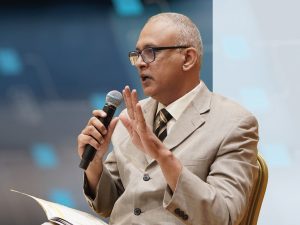In an era dominated by big data technologies, are we adequately safeguarding data ownership and other related rights? Muruga Perumal Ramaswamy, associate professor in the Department of Global Legal Studies in the Faculty of Law (FLL) at the University of Macau (UM), argues that there is a pressing need to strike a balance between technological innovation and legal considerations.
Legal Complexities of Data Use
Big data technologies are indispensable in both commercial activities and public services, yet they also present a myriad of compliance challenges, ranging from intellectual property protection and privacy to data security and recourse to dispute resolution. Prof Ramaswamy contends that an effective data strategy should extend beyond merely satisfying regulatory requirements; it should also align with voluntary industry standards. ‘Adhering to such standards not only mitigates legal risks but can also gain trust from data users and providers,’ he explains. In FLL, Prof Ramaswamy and his colleagues are engaged in research on data protection in Macao and Europe, cybersecurity in the Guangdong-Hong Kong-Macao Greater Bay Area (GBA), regulation of generative artificial intelligence, genetic data protection, and application of smart contracts.
Cultivating Talent at the Intersection of Law and Technology
‘Understanding the collection, storage, and use of data is invaluable for legal professionals, equipping them to provide more tailored legal advice and data strategies. For tech professionals, a grasp of pertinent legal frameworks is equally beneficial when it comes to data management and use,’ says Prof Ramaswamy. Against this backdrop, UM’s Institute of Collaborative Innovation, in collaboration with FLL, has launched a Data Strategy and Compliance specialisation under the university’s Master of Science in Data Science programme.
According to Prof Ramaswamy, the coordinator of this specialisation, the teaching team comprises multilingual international legal experts with extensive knowledge of various jurisdictions and legal systems. Students in this specialisation not only learn about data technologies but also explore how to apply and protect data in fields such as healthcare, biomedical research, and public administration. Moreover, students compare legal frameworks on data use and the development of artificial intelligence applications between jurisdictions.
Over the past few years, students in this specialisation have undertaken various research projects, covering topics such as the General Data Protection Regulation in the European Union, personal data protection standards in Macao, and compliance requirements in various jurisdictions within the GBA. These projects have enhanced their ability to design preventive compliance strategies, which can help reduce legal risks associated with data processing faced by organisations. This is particularly important given the substantial penalties that may result from non-compliance in cross-border data transfer and use.
Prof Ramaswamy adds that graduates of this specialisation are not only well-positioned to excel in the fields of law and dispute resolution but are also capable of securing a wide range of career opportunities in both public and private sectors. ‘A growing number of our graduates express interest in pursuing doctoral studies to delve further into advanced interdisciplinary topics in the rapidly evolving field of data strategy and compliance.’
Chinese & English Text / Davis Ip, Senior UM Reporter Ku Weng Hin
Photo / UM Reporter John Leung
Source: UMagazine ISSUE 28
Related articles:
- Improving Society Through Data Science
- Applying AI in Novel Ways
- Marketing to Minds With Data
- Extracting Financial Value From Big Data
- Crafting Tailored Cures Through Data
- Developing a Common Language for Humans and Machines
- Data Science Driving Personalised Education
- Leveraging Data to Enhance Public Services


